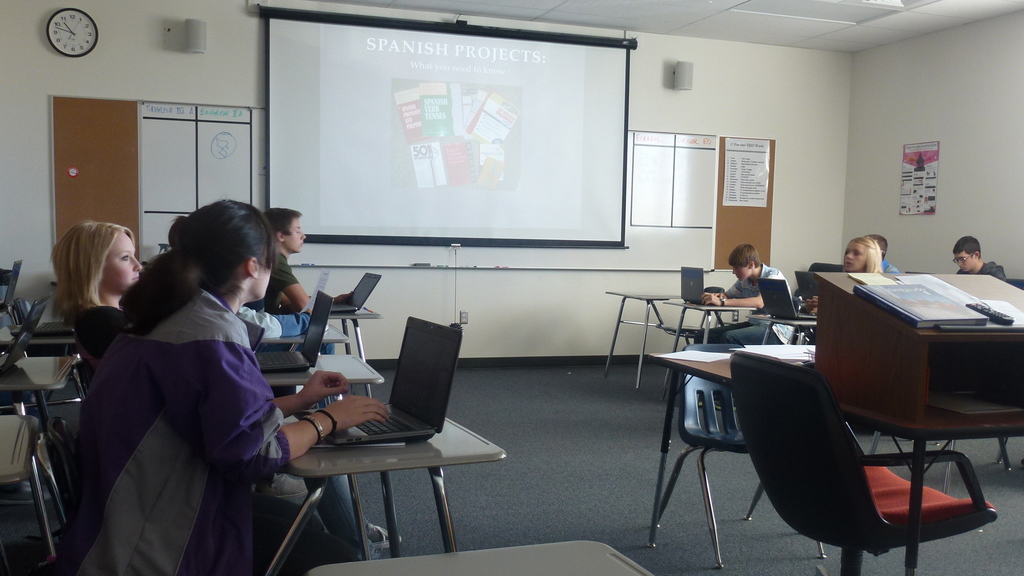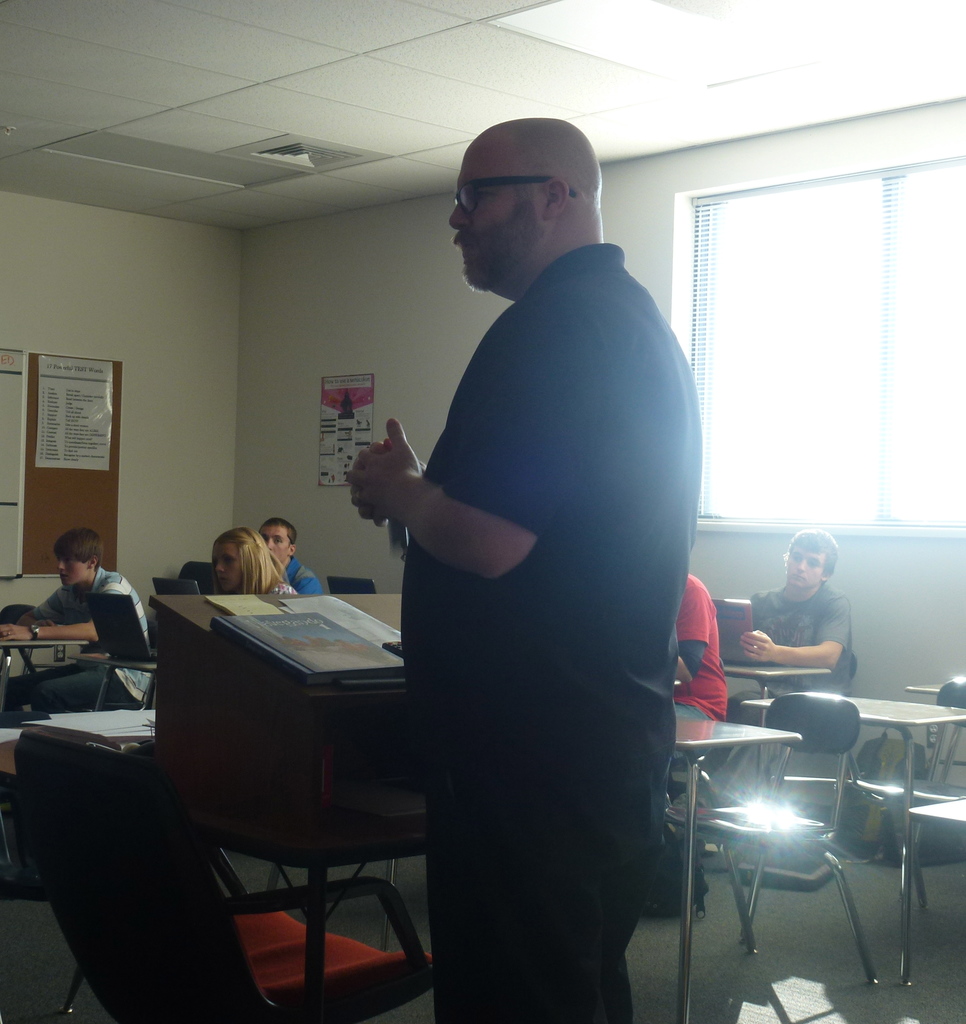
EDITOR’S NOTE: Eleven Idaho schools are launching an experiment this fall. They are using $3 million in state grants to try out methods of using technology in the schools. This is the eighth of a series of stories on the grant recipients.
In Sean Edwards’ Spanish class, 18 high school students are in the business of producing commercials.
“You guys watch on average about 25,000 commercials a year,” Edwards told his class. “I think you’re familiar with the format.”

They will work in groups of three or four to produce a 60-second ad, all in Spanish. They can memorize their ad and perform it in front of the class — or they can use their computers and video editing software to produce a digital version.
And that latter option is a lot easier this year at Eastern Idaho’s Sugar Salem High School. All of the school’s 501 students have school-issued laptops. In past years, Edwards would have to sort out groups to make sure at least one student had access to a laptop and editing software, but not now.
In Sugar Salem, administrators and teachers are six weeks into a two-year, $454,783.20 laptop pilot project. And if the approach sounds familiar, that’s no accident.
Proposition 3.1?
Sugar Salem’s application for a state technology pilot grant contains at least one testimonial: “We believe in Superintendent (of Public Instuction Tom) Luna’s vision, and we are ready to be a model of what an effective 21st century school looks like in the state of Idaho.”
Perhaps more tellingly, Sugar Salem is modeling precisely the kind of technology initiative Luna proposed with Proposition 3, the technology law rejected by voters in November. It’s a one-to-one laptop program; even the devices, Hewlett-Packard notebook laptops, are identical to the model that would have been deployed statewide in Proposition 3.
Sugar Salem chose this approach, in part, because school officials believed the state would be more likely to award a grant for a pilot modeled after Proposition 3, Principal Jared Jenks said. But Jenks believes in the idea of a uniform, statewide technology plan — and while some pilot schools are testing tablets or Chromebooks, he believes laptops are more useful for high school students.
The one-to-one laptop approach was roundly rejected statewide, with a 67 percent no vote — and in Sugar Salem’s Madison County, the no vote was 64 percent. Jenks says he has heard some concerns from parents, mostly about time management and whether software can filter objectionable material. The school has formed a parent advisory committee to help parents know what to expect from the pilot program.
The students like having the laptops, Jenks said, and they are handling them responsibly. He says he has not had to deal with disciplinary issues due to inappropriate computer use. As for the claim — advanced in anti-Proposition 3 ads last fall — that students would be careless with computers, Jenks says only one computer has been damaged from misuse.
A transformation plan
By some measures, Sugar Salem is a high-performing school. It’s a four-star school in Idaho’s most recent five-star ratings. In September, Sugar Salem was named one of the U.S. Department of Education’s 286 National Blue Ribbon Schools, thanks to increased student proficiency in reading and math; only one other Idaho school received this honor.
But Sugar Salem acknowledges room for improvement. ACT scores are on a downward trend, and lagged behind the state average in 2012. End-of-course assessment scores have been flat. Only 54 percent of seniors are enrolled in college-credit eligible classes, the school said in its grant application earlier this year; “this percentage is unacceptable for a district that is striving for success.”
But in their application, Sugar Salem officials say technology can address all of these concerns, “by transforming our students into self-directed, inquisitive learners.” In some classrooms, the changes are already occurring.
Reading and English teacher Darla Arnold says the laptops make it easier for students to find documents they need for presentations, do research on the documents, and share what they’ve learned with classmates. This ties well with the research components in the new Idaho Core Standards, which require students to “facilitate” their learning, Arnold said.
When Jared Gee’s science students are looking for information, at least one student will invariably blurt out the same suggestion: “Google it.” The challenge now is to teach students to branch out — to see Google as one tool, but not the only tool.
A learning curve
By its nature, a two-year pilot program isn’t permanent — and that is already on Jenks’ mind. He believes his school might be able to get three years’ use out of the laptops, and he worries that the high school has done away with its computer lab to shift to a laptop program. So he’s already thinking about long-range funding, so when Senate President Pro Tem Brent Hill of Rexburg spoke at the school for Constitution Day in September, Jenks took the opportunity to make a pitch.
By its nature, a pilot program also entails some trial and error. While the computers themselves are working well, Jenks said, the school is still working through software problems. Six weeks into the school year, some student laptops still aren’t synced up to a printer.
Sugar Salem opted to include a software “managed service” agreement into its pilot. This might be a must for smaller schools, Jenks said. But for a medium-sized school such as Sugar Salem, with an in-house IT staff, the agreement leaves the school “handcuffed,” he said.
It’s all part of a learning process. And on Thursday, when Luna comes to tour a school putting his laptop plan into practice, Jenks is prepared to offer a progress report. “We have learned a ton of things that we’re going to recommend.”
More stories about the 11 Idaho schools using $3 million in state grants to try out methods of using technology in the schools:
- A schoolwide Chromebooks project at Kuna Middle School.
- A career-oriented laptop pilot at Middleton High School.
- An attempt to reverse achievement gaps at Parma Middle School.
- A writing emphasis at Weiser’s Park Intermediate School.
- A collaborative learning effort at Meridian’s Discovery Elementary School.
- A student-led iPad rollout at McCall-Donnelly High School.
- An attempt to bridge geographic gaps at the Idaho Distance Education Academy.
